- Home
- David Gemmell
White Wolf: A Novel of Druss the Legend dt-10
White Wolf: A Novel of Druss the Legend dt-10 Read online
White Wolf: A Novel of Druss the Legend
( Drenai Tales - 10 )
David Gemmell
This new heroic fantasy in Gemmell`s engrossing Drenai series takes place immediately before his first published novel, Legend (1984), but stands well on its own. Skilgannon, swordmaster and former general of Queen Jianna`s army, walked away from the queen`s service after his forces sacked a city with such savagery that his name is ever after followed by "the Damned." He`s spent three trying years submitting to monastic discipline in hopes of understanding the places of man and evil in the world. His dreams are disturbed by a white wolf; his thoughts by memories of his dead wife and hopeless love for Queen Jianna. Now the surrounding town is torn by civil unrest and the monks debate fleeing: Skilgannon might have stayed with them but for the price on his head and the futility of his disguise as Brother Lantern. The abbot sends him to the capital, Mellicane, escorting an unworldly monk. In the woods outside town, they pick up the boy Rabalyn, whose troubles with a town bully ended with…
David Gemmell
White Wolf
The Damned — Book 1 (Drenai Tales — 10)
PROLOGUE
CAPHAS THE MERCHANT WAS FRIGHTENED AS THE STRANGER
approached his campfire in the woods to the north of the capital. Caphas had picked the spot with care, in a hollow away from the road, so that his fire would not be seen. Although the civil war was now ended, so great had been the losses on both sides that there were few troops left to patrol the wildlands, where renegades and deserters looted and stole. The merchant had thought long and hard about this journey, but with so many of his colleagues too terrified to enter the lands of Naashan he had seen an opportunity for huge profits from his goods: silks from Chiatze and spices from Sherak and Gothir. Now, as the full moon shone over the hollow, those profits seemed a long way away.
The rider emerged from the tree line above the camp, and angled his horse down the slope. The man’s hairstyle — the lower part of the head shaved clean, the upper hair swept into a fierce crest — showed him to be a Naashanite swordmaster. Caphas began to relax. It was unlikely such a man would prove to be a robber. There were far better ways for skilled fighters to make money in this war-torn country than by waylaying travelling merchants. The man’s clothes further reinforced this judgement.
Though functional in appearance — a dark leather jerkin, the shoulders edged with chain mail, leather leggings and high riding boots also adorned with mail — they were richly made. His black horse was Ventrian pure bred. Such beasts were rarely seen on the open market, but would sell privately for between two hundred and four hundred gold raq. The rider was quite clearly no thief. Thoughts of robbery drifted away, only to be replaced by a fear of another kind.
The man dismounted and walked to the fire. He moved with the grace common to all swordsmen, thought Caphas, who rose to greet him. Up close the rider was younger than Caphas had first thought. In his twenties.
His eyes were a piercing sapphire blue, his face handsome. Caphas bowed.
‘Welcome to my fire, sir,’ he said. ‘It is good to find company in such bleak surroundings. I am Caphas.’
‘Skilgannon,’ said the man, offering his hand.
A deep, sickening terror struck Caphas. His mouth was suddenly dry.
Aware that Skilgannon was staring at him he managed to say: ‘I… was about to prepare a small meal. You would be most welcome to share it.’
‘Thank you.’ Skilgannon’s blue eyes scanned the campsite. Then he raised his head and sniffed the air. ‘Since you are not the person wearing the perfume I suggest you invite the women to join us. There are wild beasts in the woods. Not as many wolves as once there were, but still some bears and the occasional panther.’ He swung away from Caphas and walked to the fire. It was then that the merchant saw the strange ornament he carried slung across his back. It was around five feet in length, slightly curved, the centre polished black. At each end were set beautifully sculpted ivory sections. Ornate and exquisite, it would — had he not heard the man’s name — have seemed to Caphas to serve no purpose.
Swinging the ornament from his back, the stranger placed it on the ground beside him as he sat down by the fire.
Caphas turned towards the dark woods. His heart was heavy.
Skilgannon knew the girls were there, and if he intended rape or murder they would not escape him. ‘Come in, Lucresis. Bring Phalia. It is all right,’
he called, praying it was true.
A slender, dark-haired young woman moved out of the trees, holding the hand of a girl of around seven. The child broke clear of her sister’s grip and ran to her father. Caphas put a protective arm around her, and drew her towards the fire. ‘My daughters, Phalia and Lucresis,’ he said.
Skilgannon glanced up and smiled.
‘Always wise to be wary,’ he said. ‘The girls are very beautiful. They must take after their mother.’
Caphas forced a smile. ‘Ah yes, she was the beauty. No doubt of it.’ He was dismayed to see Lucresis staring boldly at the handsome young man.
She tilted her head and ran her fingers through her long hair. She knew she was beautiful. So many young men had told her so.
‘Lucresis! Come and help me fetch the pots and pans from the wagon,’
he ordered, his voice showing his stress. Confused by his fear, the young woman followed him. As he reached the wagon he hissed at her, ‘Stop making eyes at him.’
‘He is very handsome, Father.’
‘That is Skilgannon the Damned. You want nothing to do with him. We will be lucky to escape this with our lives,’ he added, keeping his voice to a whisper. He handed her several pots.
Lucresis glanced back at the man by the fire. He was chatting to little Phalia, who was giggling at his words. ‘He won’t hurt us, Father.’
‘Do not judge a man by his looks. If only ugly men committed crimes it would take no effort at all to find offenders. I have heard tales of his excesses. Not just on the battlefield. It is said he once had a large house, and all the servants were trained whores. He is not the sort of man I would want near my daughter — had I a choice in the matter. Which I don’t,’ he concluded miserably.
‘I wish I had a choice,’ said Lucresis.
Returning to the fire, Caphas prepared a broth. The smell of it hung in the air, rich and tempting. Occasionally he would stir the contents of the large pan, then take a sip before adding a little pepper and spice. Finally he sprinkled rock salt into the pot. ‘I believe it to be ready,’ he said.
After the meal Skilgannon put his plate to one side. ‘You are a truly talented cook, Master Caphas.’
‘Thank you, sir. It is a hobby of mine.’
‘Why do you have a spider on your arm?’ asked little Phalia, pointing to the black tattoo on Skilgannon’s left forearm.
‘Do you not like it?’
‘It is very ugly.’
‘Phalia, that was rude!’ snapped Caphas. ‘It is the mark of an officer, dear heart,’ he added swiftly, realizing he had shocked the child. ‘The fighting men of Naashan adorn themselves in this way. An officer who has
… defeated… eight enemies in single combat is awarded the Spider.
Generals have panther tattoos upon their chests, or eagles if their victories are great.’ He knelt beside the child. ‘But you should not make such comments.’
‘I’m sorry, Father. But it is ugly.’
‘Children say what they think,’ said Skilgannon softly. ‘It is no bad thing. Be calm, merchant. I mean you no harm. I shall spend the night in your camp and be on my way in the morning. Your life is safe — as is the honour of y
our family. And, by the way, the house you told your daughter of was not mine. It was owned by a courtesan who was, shall we say, a friend.’
‘I did not mean to offend, sir.’
‘My ears are very keen, merchant. And I am not offended.’
‘Thank you. Thank you so much.’
They heard the sound of horses in the distance. Skilgannon rose and waited.
Within moments a column of cavalry rode into the clearing. Caphas, who had journeyed in Naashan throughout the years of civil war, knew them for the Queen’s Horse, black-clad warriors in heavy helms. Each carried a lance, a sabre, and a small round shield decorated with a spotted snake. At the head of the column was a civilian he recognized: Damalon, the Queen’s favourite. His hair was long and blond, his face lean. The fifty riders sat their mounts silently, while Damalon leapt lightly to the ground.
‘It has been a long ride, general,’ he said to Skilgannon.
‘And why did you make it?’ asked the warrior.
‘The Queen wants the Swords of Night and Day returned.’
‘They were a gift,’ said Skilgannon. He shrugged. ‘However, be that as it may.’
Lifting the curious ornament he held it for a moment, then tossed it to Damalon. In that moment Caphas saw a spasm of pain flicker on Skilgannon’s face.
The handsome courtier glanced back to the soldiers. ‘No need for you to stay, captain,’ he told a tall man sitting a chestnut gelding. ‘Our task here is concluded.’
The rider edged his horse forward. ‘Good to see you again, general,’ he said to Skilgannon. ‘May the gods be with you.’
‘And with you, Askelus,’ answered Skilgannon.
The cavalry swung their mounts and rode from the clearing. All that remained were four riders, dark-garbed men carrying no swords. Long knives hung at their belts. They dismounted and walked to stand alongside Damalon.
‘Why did you leave?’ Damalon asked Skilgannon. ‘The Queen admired you above all her generals.’
‘For reasons of my own.’
‘Most odd. You had it all. Riches, power, a palace a man might die for.
You could have found another wife, Skilgannon.’ Damalon curled his hand around one of the ivory handles, then pulled upon it. Nothing happened.
‘Press the ruby stud on the hilt,’ said Skilgannon. ‘It will release the blade.’ The moment Damalon pressed the stud a sword slid clear.
Moonlight shone upon the silver steel and the runes engraved there.
Caphas stared at the sword with undisguised avarice. The Swords of Night and Day were legendary. He idly wondered what they would fetch if offered to a king. Three thousand raq? Five thousand?
‘Most beautiful,’ said Damalon. ‘It stirs the blood.’
‘My advice to you — and your followers — would be to remount and leave,’
said Skilgannon. ‘As you say, your mission is concluded.’
‘Ah, not quite,’ said Damalon. ‘The Queen was very angry when you left.’
‘She will be angrier still if you do not return,’ said Skilgannon. ‘And I am tiring of your company. Understand me, Damalon, I do not wish to kill you and your creatures. I merely wish to ride away and leave this land.’
‘Your arrogance is overwhelming,’ snarled Damalon. ‘I have your swords, and four men skilled with the blade, and you threaten me? Have you lost your wits?’ He glanced at Caphas. ‘Such a shame you were here, merchant. Fate, I suppose. No man can avoid it.’ Damalon pressed an emerald stud on the second hilt. The black scabbard fell to the ground as a second blade slid clear. It shone like gold, bright and precious. For a moment the blond courtier stood very still, drinking in the beauty of the swords. Then he shook his head, as if coming out of a trance. ‘Kill the old man and the child,’ he said. ‘The girl will prove an amusing distraction before we return to the capital.’
In that moment Caphas saw Skilgannon move towards Damalon. His hand flicked forward. Something bright and glittering flashed through the air. It struck Damalon lightly in the throat.
Blood sprayed from the severed jugular. What followed Caphas would never forget, not in the tiniest detail.
Skilgannon moved in on Damalon. As the dying courtier dropped the swords Skilgannon swept them up. The four black-garbed killers ran in.
Skilgannon leapt to meet them, the sword blades shimmering in the firelight. There was no fight, no clash of steel upon steel. Within a matter of heartbeats five men were dead upon the ground — one virtually beheaded, another cut through from shoulder to belly. Caphas watched as Skilgannon cleaned the gold and silver blades before sliding them back into the single black scabbard, which he swung onto his back.
‘Best you find new markets, Caphas,’ he said. ‘I fear Naashan will now be dangerous for you.’
The man was not even out of breath and there was no trace of sweat upon his brow. Turning from Caphas, he walked back and searched the ground around Damalon’s body. Stooping, he picked up a small, circular piece of blood-smeared metal no more than two inches in diameter, and wiped it clean on Damalon’s shirt. Caphas saw then that the metal had a serrated edge. He shivered. Skilgannon tucked the weapon into a sheath hidden behind his belt. Then he moved to his horse and saddled it.
Caphas approached him. ‘They were going to kill us too,’ he said. ‘I thank you for saving my daughters and myself.’
‘The child is frightened, Caphas. Best you go to her,’ said Skilgannon, stepping up smoothly into the saddle.
Lucresis ran to his horse. ‘I too am grateful,’ she said, staring up at him wide-eyed. He smiled at her, then leaned down, took her hand and kissed it.
‘Be lucky, Lucresis,’ he said. ‘It would have been most pleasant to spend a little more time in your company.’ Releasing her hand he looked back at Caphas, who was holding his younger daughter close. ‘Do not stay here tonight. Prepare your wagon and head north at speed.’
With that he rode away.
Caphas watched him until he was lost among the trees. Lucresis sighed and turned to her father. ‘I wish he had stayed.’
The merchant shook his head in disbelief. ‘You just saw him kill five men. He is ruthless and deadly, Lucresis.’
‘Perhaps, but he has beautiful eyes,’ she replied.
CHAPTER ONE
SMOKE FROM THE BURNING BUILDINGS STILL HUNG IN THE
AIR, BUT THE rioting mobs of yesterday had dispersed now, as the two priests walked slowly down the hill towards the town. Heavy clouds were gathering over the eastern mountains, promising rain for the afternoon, and a cool wind was blowing. The walk from the old monastery buildings to the little town was one that Brother Braygan usually enjoyed, especially with the sunshine glinting from the white buildings, and glittering on the rushing river. The chubby young priest loved to see the colourful meadow plants, so small and ephemeral against the backdrop of the eternal, snow-capped mountains. Not so today. Everything seemed different. The beauty was still there, but now an underlying sense of menace and real peril hung in the air.
‘Is it a sin to be frightened, Brother Lantern?’ he asked his companion, a tall young man with eyes of cold and brilliant blue, upon whom the pale robes of the acolyte seemed out of place.
‘Have you ever killed a man, Braygan?’ Lantern’s reply was cold and disinterested.
‘Of course not.’
‘Or robbed, or raped or stolen?’
Braygan was shocked and stared up at his companion, his fears momentarily forgotten. ‘No.’
‘Then why do you spend so much time worrying about sin?’
Braygan fell silent. He never enjoyed working alongside Brother Lantern. The man said very little, but there was something about him that was wholly disturbing. His deep-set sapphire eyes were fierce, his lean face hard, his expressions unyielding. And he had sword scars upon his arms and legs. Braygan had seen them when they worked in the fields in the summer. He had asked about them, but Lantern had ignored him, as he ignored questions concerning the harsh and warlike t
attoos upon his back, chest and arms: an eagle with outstretched wings and open talons between his shoulder blades, a large spider on his left forearm, and the snarling head of a panther upon his chest. When questioned about them Lantern would merely turn his cold eyes on the speaker and say nothing.
Yet in all else he was an exemplary acolyte, working hard and never shirking his duties. He never complained, or argued, and attended all prayer and study meetings. When required he could quote verbatim from all sections of holy script, and knew also much of the history of the nations surrounding the Land.
Braygan turned his attention back towards the town, and his fear returned. The soldiers of the Watch had done nothing to stop the rioters.
Two days ago the mob had attacked Brother Labberan and broken his arms when he went to teach at the church school. They had kicked and punched him, then struck him with rods of iron. Labberan was not a young man, and could easily have died.
The two priests came to the small bridge over the river. Braygan trod on the hem of his pale blue robe and stumbled. He would have fallen, but Brother Lantern’s hand grabbed his arm, hauling him upright.
‘Thank you,’ said Braygan. His arm hurt from the iron grip and he rubbed it.
There were some people moving through the rubble. Braygan tried not to stare at them — or at the two bodies hanging from the branches of a tall tree. They looked like foreigners, he thought. ‘I am frightened, Brother,’ he whispered. ‘Why do people do such hateful things?’
‘Because they can,’ answered the tall priest.
‘Are you frightened?’
‘Of what?’
The question seemed ridiculous to Braygan. Brother Labberan had been beaten close to death, and there was hatred everywhere. In the capital, Mellicane, a group known as the Arbiters had grown in power. Priests there had been murdered, or accused of treason and hanged. Now a representative of the Arbiters had arrived in Skepthia, touring taverns and meeting halls, speaking out against the church and its priests. And the terror continued to grow.

 Bloodstone
Bloodstone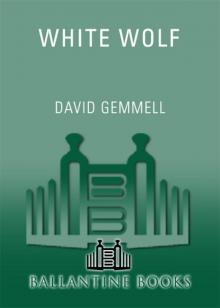 White Wolf
White Wolf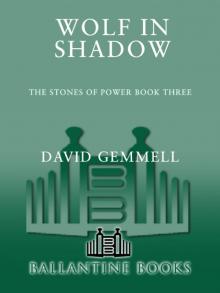 Wolf in Shadow
Wolf in Shadow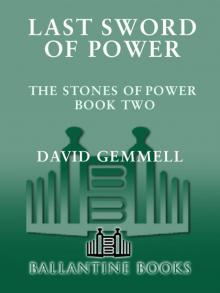 Last Sword of Power
Last Sword of Power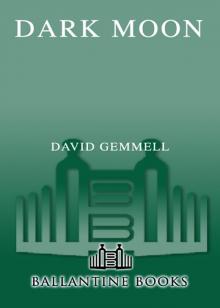 Dark Moon
Dark Moon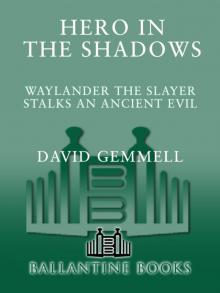 Hero in the Shadows
Hero in the Shadows Gemmell, David - Drenai 09 - Hero In The Shadows
Gemmell, David - Drenai 09 - Hero In The Shadows Waylander
Waylander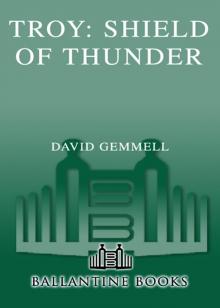 Shield of Thunder
Shield of Thunder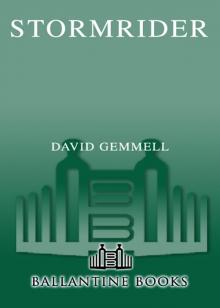 Stormrider Stormrider
Stormrider Stormrider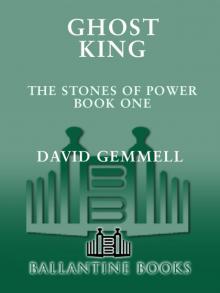 Ghost King
Ghost King Legend
Legend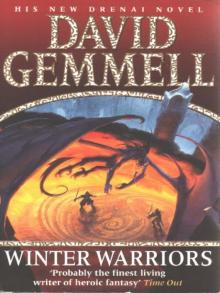 Winter Warriors
Winter Warriors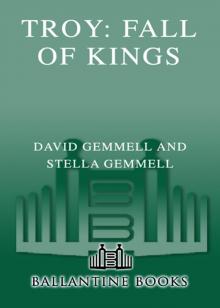 Fall of Kings
Fall of Kings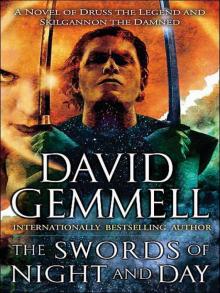 The Swords of Night and Day
The Swords of Night and Day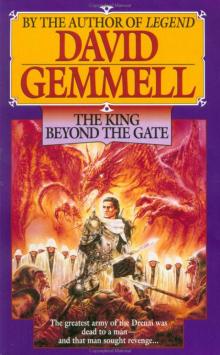 The King Beyond the Gate
The King Beyond the Gate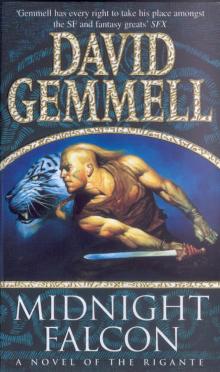 Midnight Falcon
Midnight Falcon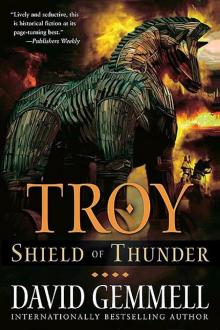 02 - Shield of Thunder
02 - Shield of Thunder In the Realm of the Wolf
In the Realm of the Wolf Ravenheart
Ravenheart The First Chronicles of Druss the Legend
The First Chronicles of Druss the Legend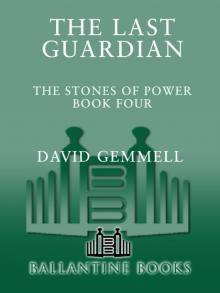 Last Guardian
Last Guardian Stormrider
Stormrider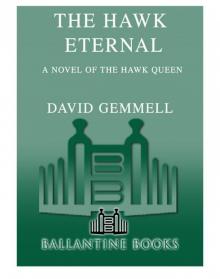 The Hawk Eternal
The Hawk Eternal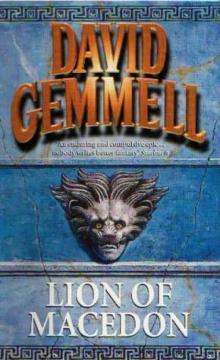 Lion of Macedon
Lion of Macedon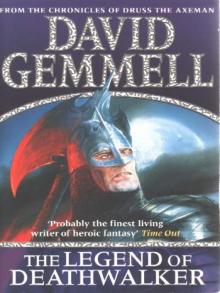 The Legend of Deathwalker
The Legend of Deathwalker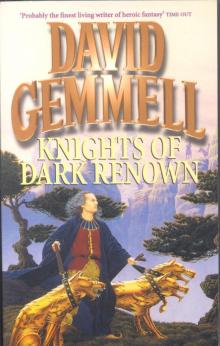 Knights of Dark Renown
Knights of Dark Renown Echoes of the Great Song
Echoes of the Great Song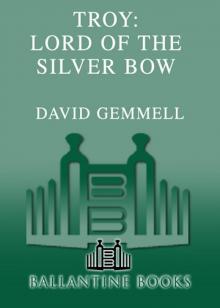 Lord of the Silver Bow
Lord of the Silver Bow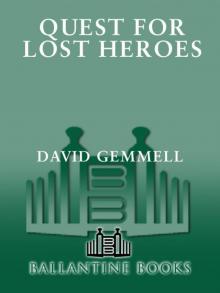 Quest for Lost Heroes
Quest for Lost Heroes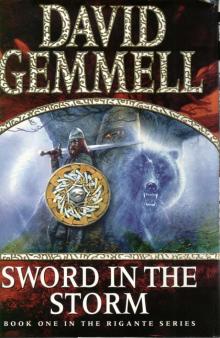 Sword in the Storm
Sword in the Storm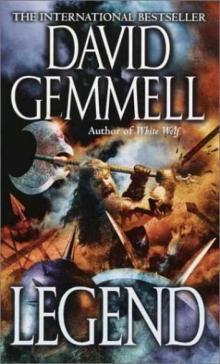 Drenai Saga 01 - Legend
Drenai Saga 01 - Legend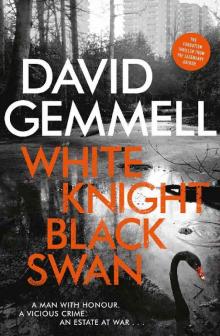 White Knight/Black Swan
White Knight/Black Swan![[Troy 02] - Shield of Thunder Read online](http://i1.bookreadfree.com/i/03/19/troy_02_-_shield_of_thunder_preview.jpg) [Troy 02] - Shield of Thunder
[Troy 02] - Shield of Thunder Lord of the Silver Bow t-1
Lord of the Silver Bow t-1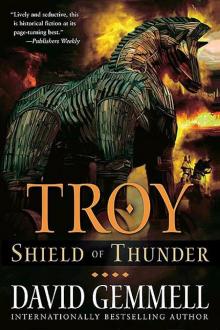 Shield of Thunder t-2
Shield of Thunder t-2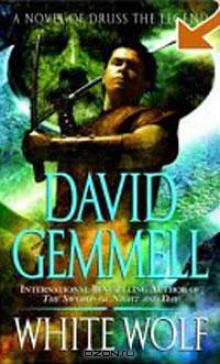 White Wolf: A Novel of Druss the Legend dt-10
White Wolf: A Novel of Druss the Legend dt-10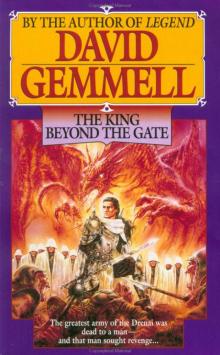 Drenai Saga 02 - The King Beyond the Gate
Drenai Saga 02 - The King Beyond the Gate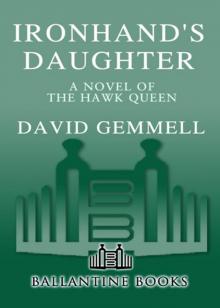 Ironhand's Daughter
Ironhand's Daughter Gemmell, David - Drenai 06 - The First Chronicles of Druss the Legend
Gemmell, David - Drenai 06 - The First Chronicles of Druss the Legend The Last Guardian
The Last Guardian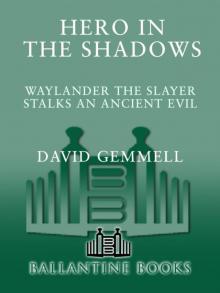 Hero in the Shadows: A Waylander the Slayer Novel
Hero in the Shadows: A Waylander the Slayer Novel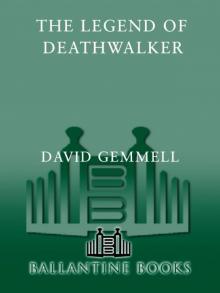 The Legend of the Deathwalker
The Legend of the Deathwalker